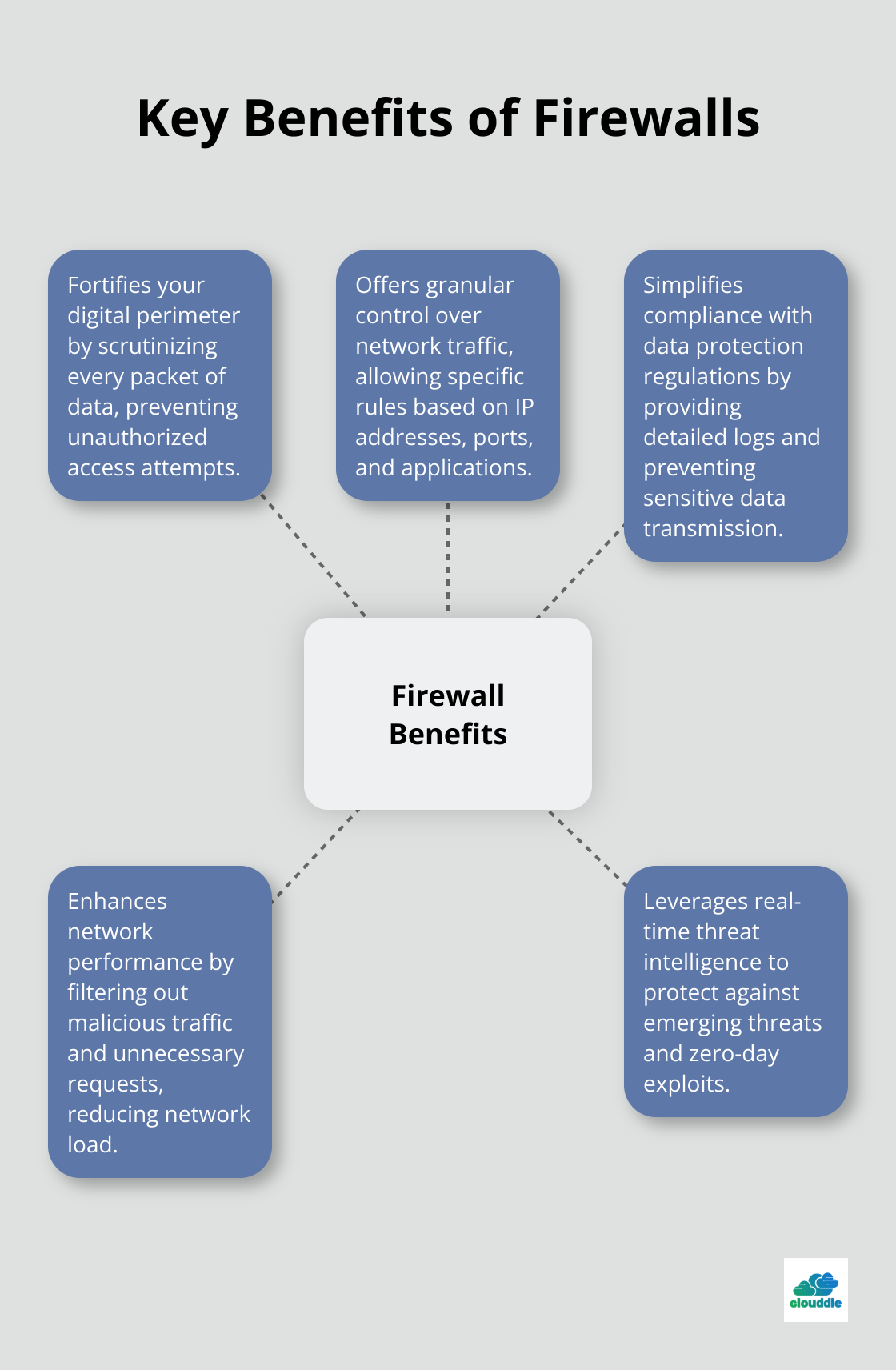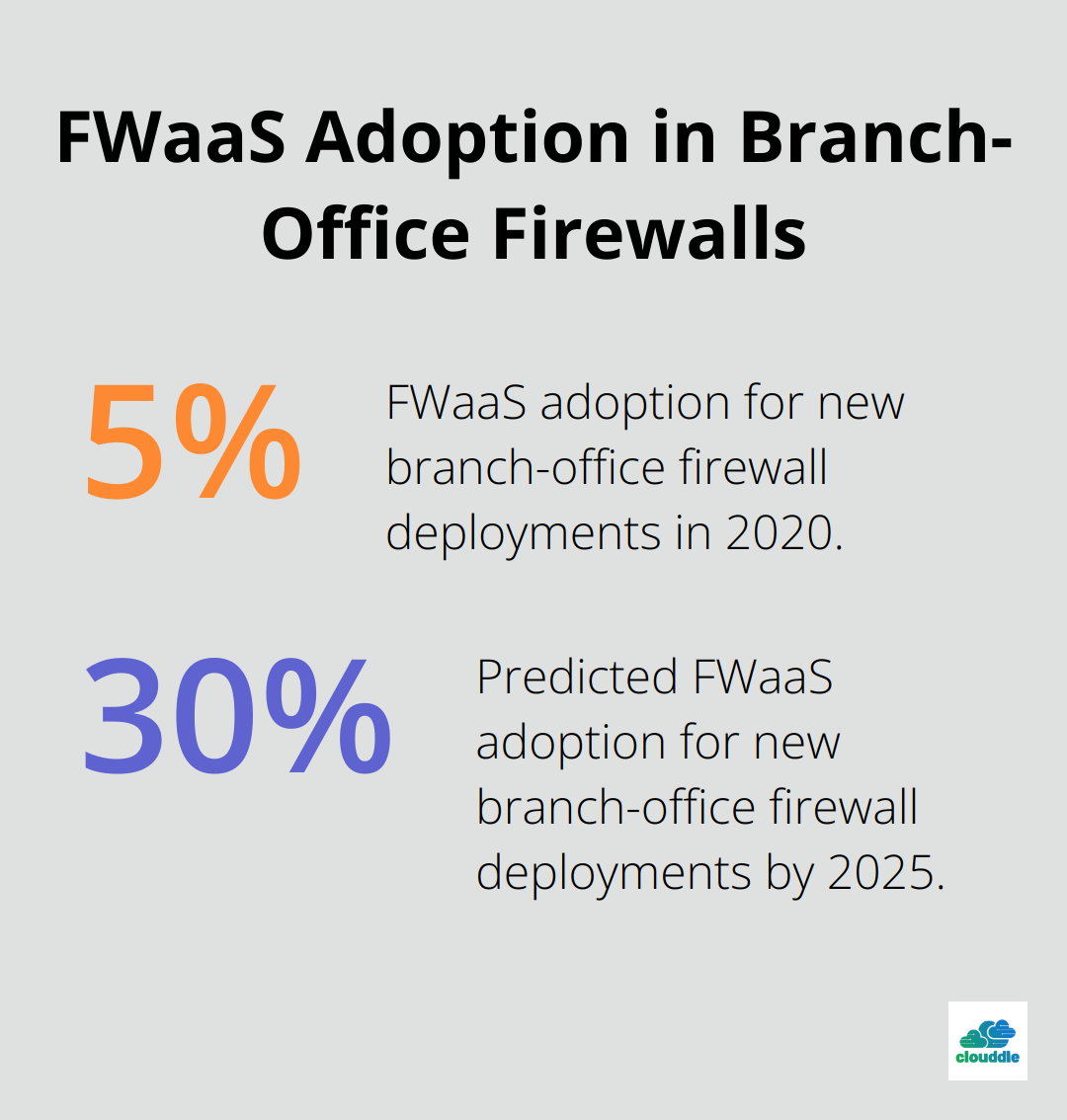In today’s digital landscape, network security is paramount. Firewalls stand as the first line of defense against cyber threats, offering a robust shield for businesses of all sizes.
At Clouddle, we’ve seen firsthand how implementing effective firewall solutions can dramatically improve network firewall security benefits. This post will explore the key advantages of firewalls and provide practical tips for maximizing their potential in your organization.
What Are Firewalls and How Do They Work?
Firewalls form the foundation of network security, acting as a barrier between trusted internal networks and potentially dangerous external ones. They monitor and control incoming and outgoing network traffic based on predetermined security rules.
The Evolution of Firewall Technology
Firewall technology has transformed since its inception in the late 1980s. Early packet-filtering firewalls examined only the headers of data packets. Today’s Next-Generation Firewalls (NGFWs) inspect data on a deeper level to identify and block threats that may be hidden in normal-seeming traffic.
A recent Gartner report indicates that Zero Trust Network Access (ZTNA) is the fastest-growing segment in network security, forecast to grow 36% in 2022 and 31% in 2023. This shift underscores the growing importance of sophisticated firewall solutions in modern network security strategies.

Types of Firewalls: Choosing the Right Protection
Hardware firewalls are physical devices that sit between your network and the internet. They protect businesses with multiple connected devices without impacting system performance.
Software firewalls are programs installed on individual computers. They provide customized protection for each device but may slightly affect system performance.
Cloud-based firewalls (also known as Firewall-as-a-Service or FWaaS) offer scalability and ease of management. They excel in protecting businesses with remote workers or multiple locations.
The Impact of AI on Firewall Technology
Artificial Intelligence (AI) revolutionizes firewall technology. AI-powered firewalls adapt to new threats in real-time, which improves threat detection and response times.
Beyond Firewalls: A Multi-Layered Approach
While firewalls play a vital role, they represent just one part of a comprehensive security strategy. A multi-layered approach (combining firewalls with other security measures like intrusion detection systems and regular security audits) provides optimal protection.
As we move forward, let’s explore the key benefits of implementing firewalls in your network infrastructure. These advantages will demonstrate why firewalls remain an essential component of any robust security strategy.
Why Firewalls Are Essential for Network Security

Fortifying Your Digital Perimeter
Firewalls act as vigilant gatekeepers, scrutinizing every packet of data that attempts to enter or leave your network. This meticulous inspection process prevents unauthorized access attempts and mitigates various cyber threats. Cybersecurity Ventures expects global cybercrime costs to grow by 15 percent per year over the next five years, reaching $10.5 trillion USD annually by 2025. A robust firewall strategy serves as your first line of defense against becoming part of this alarming statistic.
Granular Control Over Network Traffic
Modern firewalls offer unprecedented control over network traffic. They allow you to set specific rules based on IP addresses, ports, and applications. This granularity enables you to block potentially harmful traffic while ensuring that legitimate business communications flow unimpeded. You can configure your firewall to allow only specific types of traffic during business hours, which reduces the attack surface during off-hours.
Simplifying Compliance
Data protection regulations (like GDPR, HIPAA, and PCI DSS) mandate strict control over data access and transmission. Firewalls play a pivotal role in meeting these requirements. They provide detailed logs of network activity, which prove invaluable for audits and demonstrating compliance. Advanced firewalls can automatically detect and prevent the transmission of sensitive data, such as credit card numbers or personal health information.
Enhancing Network Performance
Contrary to the misconception that firewalls slow down networks, modern firewalls can actually improve overall network performance. By filtering out malicious traffic and unnecessary requests, firewalls reduce the load on your network infrastructure. This results in faster response times for legitimate traffic and improved user experience. Some next-generation firewalls even incorporate load balancing features, further optimizing network performance.
Leveraging Real-time Threat Intelligence
Today’s sophisticated firewalls use real-time threat intelligence feeds to stay ahead of emerging threats. This means your network receives protection not just against known vulnerabilities, but also against zero-day exploits. For example, Palo Alto Networks’ firewalls (a competitor to Clouddle) blocked 44.9 billion threats in 2021 alone, showcasing the scale and importance of continuous threat intelligence.
Implementing firewalls creates a secure environment where your business can thrive. As cyber threats continue to evolve, firewalls remain an indispensable tool in your security arsenal. Now, let’s explore the best practices for implementing firewalls to maximize their effectiveness in your organization.
How to Implement Firewalls Effectively
Conduct a Comprehensive Network Assessment
Before you select a firewall solution, perform a thorough network assessment. Map out your entire network infrastructure, identify potential vulnerabilities, and understand your specific security needs. A 2022 study by Ponemon Institute found that organizations with a comprehensive understanding of their network topology were 2.5 times more likely to detect and respond to threats quickly.
During the assessment, focus on your network traffic patterns, data flow, and potential bottlenecks. This information will guide you in choosing a firewall that can handle your network‘s capacity without compromising performance.
Choose the Right Firewall for Your Business
Selecting the appropriate firewall solution is essential for optimal protection. Consider factors such as your business size, industry-specific regulations, and budget constraints. Small businesses might find a software firewall sufficient, while larger enterprises often require hardware firewalls or a combination of both.
Cloud-based firewalls, or Firewall-as-a-Service (FWaaS), have gained popularity due to their scalability and ease of management. Gartner predicts that by 2025, 30% of new deployments of distributed branch-office firewalls will switch to FWaaS, up from less than 5% in 2020.

Industries with strict compliance requirements (such as healthcare or finance) should look for firewalls with built-in compliance features. These can significantly simplify your regulatory adherence process.
Optimize Configuration and Update Regularly
Proper configuration maximizes your firewall’s effectiveness. Follow the principle of least privilege – allow only the minimum access necessary for each user or application. This approach can reduce your attack surface by up to 70% (according to a report by the SANS Institute).
Review and update your firewall rules regularly. Remove outdated or redundant rules to improve performance and reduce complexity. A study by Firemon revealed that 65% of organizations have more than 10 firewall rules that are never used.
Keep your firewall software or firmware up-to-date. Cybercriminals often exploit known vulnerabilities in outdated systems. Set up automatic updates where possible, and create a schedule for manual updates when necessary.
Invest in Employee Training and Security Awareness
Even the most sophisticated firewall can’t protect against human error. Invest in comprehensive security awareness training for all employees. The 2021 Verizon Data Breach Investigations Report found that 85% of breaches involved a human element, highlighting the importance of this step.
Train employees to recognize phishing attempts, use strong passwords, and follow security protocols. Regular simulated phishing exercises can help reinforce these lessons. Companies that conduct regular security awareness training report a 70% improvement in employee behavior (according to a study by Infosec Institute).
Final Thoughts
Firewalls provide essential network security benefits, protecting against unauthorized access and offering granular control over traffic. Organizations must implement ongoing firewall management, including regular updates and configuration reviews, to maintain effectiveness. The future of firewall technology will integrate AI and machine learning, enabling quicker adaptation to new threats and more robust protection.
Cloud-based firewalls and integration with other security solutions will enhance capabilities, offering comprehensive and flexible options. These advancements will help organizations build resilient defenses against evolving cyber threats, ensuring operational security and continuity. Clouddle leverages cutting-edge firewall technology to provide robust protection for businesses across various industries.
We combine networking, entertainment, and security solutions to offer a comprehensive approach to network security. This approach aligns with the evolving needs of modern businesses in an increasingly connected world. Firewalls will continue to play a vital role in safeguarding digital assets and maintaining a strong security posture.


